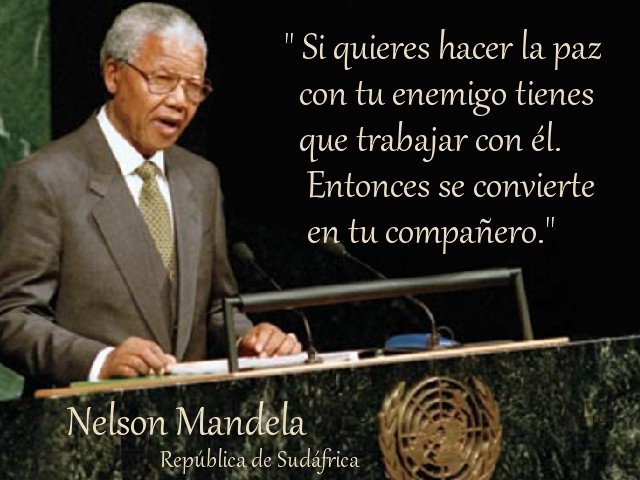Image may be NSFW.
Clik here to view.
Mandela's interior thoughts during his 27 years in prison have only recently come to light. Honesty, humility, a readiness to serve others, he said, were 'qualities within easy reach of every soul.'
Related stories
Now he belongs to the ages.
His middle name means “troublemaker," and in the 1960s Mandela was branded a terrorist. But at the end of his life he was revered globally by rich and poor, leftists and rightists, presidents and laborers, blacks and whites. In a skeptical age, Mandela was a hero for people who didn’t have heroes.
The arc of his 95-year life was extraordinary, even as many of its most crucial spiritual awakenings appear now to have taken place during long years in prison.
His life reads like an endless series of firsts: the first in his family to go to school, the first black man to open a law firm in South Africa, the nation’s first black president.
For many of us, Mandela arrived on the world stage in 1990 as history turned a corner no one could imagine:China was asking itself about democracy in the tragedy of Tiananmen Square. The Soviet Union was falling like a series of dominoes, shortly after the fall of the Berlin Wall. In South Africa, decades of apartheid were ending.
It was a time of miracles, rainbows, unseen hopes, and new fears. Even though it all arrived together, no one predicted it.
Mandela emerged from prison with a smile like perpetual summer and a light touch. He seemed filled with history and humility, and he waved to the world just as video and celebrity culture were hitting a peak. He bespoke the globalizing times – was a reconciler and statesman who articulated racial equality in a way that penetrated to the heart.
“I stand here before you not as a prophet but as a humble servant of you, the people,” he said. “Your tireless and heroic sacrifices have made it possible for me to be here today. I therefore place the remaining years of my life in your hands."
Before that moment, the last time we had heard from Mandela was the year after Martin Luther King Jr. gave his “Dream” speech at the Lincoln Memorial. It was 1964: Mandela was in the dock, on trial, facing a death sentence, saying, “I have fought against white domination and I have fought against black domination. It is an ideal for which I am prepared to die.”
Then he disappeared, and in many ways had died to the world.
During the 1960s, '70s, and '80s, he sat in Robben Island prison; it might as well have been the dark side of the moon. Those years had little silver lining: no flowers, meetings with world leaders, plaudits, cameras, attention. No one expected the Soviet Union to collapse, for China to become the workshop of the world, or for a black man named after Britain's Admiral Horatio Lord Nelson to help peaceably end apartheid.
Only recently has Mandela’s thinking at this time come to light. His many public speeches are known. But his interior self during the depths of prison have not been. Yet they bespeak a man who found the strength not to hate, and who, while savvy to the world, also had a separate “spiritual life.”
The remainder of this article is accessible at http://www.csmonitor.com/World/Africa/2013/1206/Nelson-Mandela-and-the-foundations-of-one-s-spiritual-life-video?cmpid=editorpicks&google_editors_picks=true



